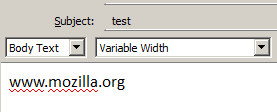
type a URL in an outgoing message without creating a hyperlink
Some e-mail correspondents have corporate firewalls that are very rigorous. Is there a way for me to simply type a URL into a message so it appears as plain text and does not create a "live" link? Then the reader can cut-and-paste the URL into their browser.
Ọ̀nà àbáyọ tí a yàn
Being blue doesn't mean it has been formatted. That can be done on receipt or when the message is viewed. It doesn't necessarily imply that the formatting was done before you sent it. Use ctrl+u to see the source of the message. It'll have lots of "<a href=... >" stuff if it has truly been preformatted. Yours has; the Compose window had the font selection toolbar.
Hold down shift when clicking Write or Reply and it will open in the alternative mode to the default. The absence of the text formatting toolbar should indicate that you have found plain text mode. There is also a setting in the menu to set the Delivery Format, which lets you force a variant of plain text even if you composed using HTML.
If you want to always compose in plain text, you can clear the checkbox for HTML-formatted text under Composition & Addressing in the account settings.
Ka ìdáhùn ni ìṣètò kíkà 👍 1All Replies (6)
I think that if you used plain text then Thunderbird would just send it "as-is" and any activation that made it a link would have to be done at the recipient's email client.
Unfortunately, the problem may be at the firewall. It may be scanning the contents of messages and looking for things that might be links, much as this forum's mark-up system does.
I have had some success in the past when posting in this forum and wanting to stop things appearing as links by replacing key characters by their html codes. But as of now I can't make this work, and you might have a similar problem. The success depends on how deep the parsing goes. Here it apparently translates the codes to their characters and then assess the resulting string, thereby defeating my attempts at obfuscation.
Previously, I used cut-and-paste, but just now I typed in a URL by hand and still the same thing happened. If I look at the message in my "sent" folder, the URL is an active link (underlined, in blue). Hovering the mouse over it displays the (same) link address in the lower left of the screen.
Maybe my message will get thru to the intended recipients anyway, but it just seems to me that there ought to be an option somewhere that tells Thunderbird to treat everything I type as plain text, without automatically recognizing and activating hyperlinks.
I did say, and I'll say it again: send your messages in plain text format. Plain text has no means to encode or transmit the special interpretation of an URL or URI. Any dressing up you see is a rendering trick at the receiver's end.
I have attached an image showing the entirety of the source code of a short plain text message including an URL. There is NO special mark-up that would activate the link. It's just a string of readable characters.
Your remaining challenge is that the security software at the other end might "read" (formally, parse) this email and detect the link, since the character string contents obey the rules for being an URL.
I suspect that the usual tricks, such as zipping, or sending it as a separate document will also fail, since the security software is probably equally hostile towards attachments, particularly "binary" ones such as doc, docx or zip files.
Zenos, thank you for responding. But I think that your suggestion is exactly what I was asking about, and I still don't understand. Can you please explain how to "send my message in plain text format"? I typed it in without using any formatting. But it ends up getting formatted. See these examples: On the left as I typed it, before I clicked send, and on the right as it displays in the "Sent" folder. The link in the "Sent" message is active.
Ti ṣàtúnṣe
Ọ̀nà àbáyọ Tí a Yàn
Being blue doesn't mean it has been formatted. That can be done on receipt or when the message is viewed. It doesn't necessarily imply that the formatting was done before you sent it. Use ctrl+u to see the source of the message. It'll have lots of "<a href=... >" stuff if it has truly been preformatted. Yours has; the Compose window had the font selection toolbar.
Hold down shift when clicking Write or Reply and it will open in the alternative mode to the default. The absence of the text formatting toolbar should indicate that you have found plain text mode. There is also a setting in the menu to set the Delivery Format, which lets you force a variant of plain text even if you composed using HTML.
If you want to always compose in plain text, you can clear the checkbox for HTML-formatted text under Composition & Addressing in the account settings.
Ti ṣàtúnṣe
OK, the Shift-click method works. But the thing that was throwing me for a loop is that when I looked at the message either in my Sent folder or in the Incoming folder, it always showed up as a live link. Only when I opened the "sent" message and looked at it with Ctrl-u did I realize that the actual message sent did not have a live URL link! I couldn't find a way to disable that... but that's not important. You definitely opened my eyes to functions that I did not know existed. Thank you!



